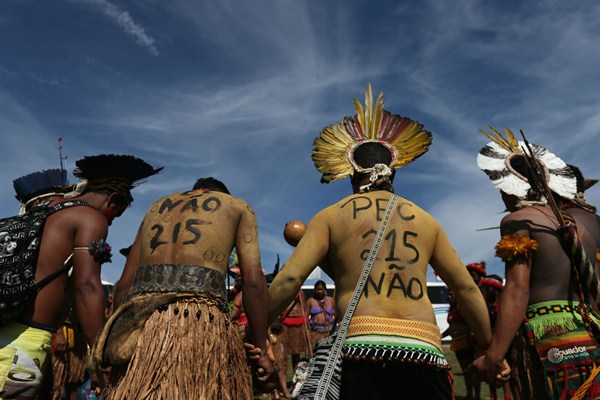In June 2014, a video released by FUNAI, the Portuguese acronym for Brazil’s Department for Indian Affairs, captures the moment seven members of an unnamed, previously uncontacted tribe from the Amazon rainforest made their first voluntary contact with the modern world. The video shows the men emerging naked from the forest onto the banks of the River Envira in the western Brazilian state of Acre, close to the Peruvian border. After calling out, singing and signaling with their hands, they crossed the river to a small indigenous settlement of the local Ashaninka people on the other side. The men told the Ashaninka that they had left the forest to seek help after an attack on their village by what was thought to be a gang of drug traffickers killed several people.
In another recent instance of first contact, Irahoa Awa of the nomadic hunter-gatherer Awa people in the state of Maranhao, in northern Brazil, emerged from the forest with his mother Jakarewyj and his aunt Amakaria in late December 2014. They had been forced out of their forest home, he said, after it had become surrounded by loggers. Shortly afterward, the women, who told of deaths among the forest tribe from respiratory diseases, contracted tuberculosis. Both later recovered.
For the indigenous peoples of the Amazon’s forests, colonization is hardly a closed chapter of history. More than 500 years since the first European incursions into Brazil, many of the region’s roughly 900,000 indigenous inhabitants still face an ongoing battle against the invasion and expropriation of their lands. Indigenous communities suffer the adverse effects of logging and mining, both legal and illegal, as well as of large hydro-electric plants. Clashes with outsiders often turn violent. Indigenous communities are also deprived of government services, with poor access to health care and education and few alternatives for generating a sustainable income. In many cases, they lack the right to legally inhabit their lands at all. And although indigenous groups are active in civil society, Brazil’s National Congress currently has no indigenous members; historically, it has only had one.

